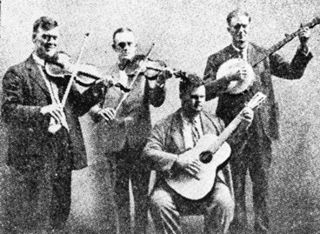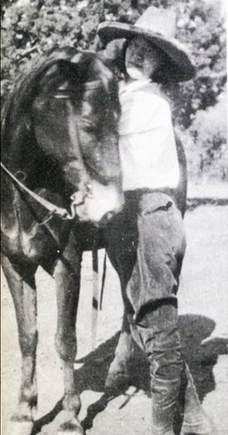Related Research Articles

OKeh Records is an American record label founded by the Otto Heinemann Phonograph Corporation, a phonograph supplier established in 1916, which branched out into phonograph records in 1918. The name was spelled "OkeH" from the initials of Otto K. E. Heinemann but later changed to "OKeh". Since 1965, OKeh was a subsidiary of Epic Records, a subsidiary of Sony Music. Today, OKeh is a jazz imprint, distributed by Sony Masterworks.

Old-time music is a genre of North American folk music. It developed along with various North American folk dances, such as square dancing, clogging, and buck dancing. It is played on acoustic instruments, generally centering on a combination of fiddle and plucked string instruments, most often the banjo, guitar, and mandolin. Together, they form an ensemble called the string band, which has historically been the most common configuration to play old-time music. The genre is considered a precursor to modern country music.

"Fiddlin'" John Carson was an American old-time fiddler and singer who recorded what is widely considered to be the first country music song featuring vocals and lyrics.

The Bristol Sessions were a series of recording sessions held in 1927 in Bristol, Tennessee, considered by some as the "Big Bang" of modern country music. The recordings were made by Victor Talking Machine Company producer Ralph Peer. Bristol was one of the stops on a two-month, $60,000 trip that took Peer through several major southern cities and yielded important recordings of blues, ragtime, gospel, ballads, topical songs, and string bands. The Bristol Sessions marked the commercial debuts of Jimmie Rodgers and the Carter Family. As a result of the influence of these recording sessions, Bristol has been called the "birthplace of country music". Since 2014, the town has been home to the Birthplace of Country Music Museum.

Appalachian music is the music of the region of Appalachia in the Eastern United States. Traditional Appalachian music is derived from various influences, including the ballads, hymns and fiddle music of the British Isles, the African music and blues of early African Americans, and to a lesser extent the music of Continental Europe.

Wade Ward (1892–1971) was an American old-time music banjo player and fiddler from Independence, Virginia. He was widely known playing the clawhammer banjo and frequently won the Galax, Virginia Old Time Fiddler's Convention. His instrument, a Gibson RB-11 5-string banjo, is now in the collection of the Smithsonian Institution. Along with Kyle Creed, Wade Ward is known for his 'Galax' style of playing the clawhammer banjo.

Alexander Campbell "Eck" Robertson was an American fiddle player, mostly known for commercially recording the first country music songs in 1922 with Henry Gilliland.
The Murder of Mary Phagan is a 1988 American two-part television miniseries starring Jack Lemmon about the murder of a 13-year-old factory worker and the subsequent trial of her accused murderer Leo Frank. The supporting cast features Richard Jordan, Robert Prosky, Peter Gallagher, Kathryn Walker, Rebecca Miller, Paul Dooley, Charles Dutton, Kevin Spacey, Cynthia Nixon, Dylan Baker and William H. Macy.
This is a list of notable events in country music that took place in the year 1924.
This is a list of notable events in country music that took place in the year 1923.

The Skillet Lickers were an old-time band from Georgia, United States.
William Henry Whitter was an early old-time recording artist in the United States. He first performed as a solo singer, guitarist and harmonica player, and later in partnership with the fiddler G. B. Grayson. He recorded the first version of "Going Down the Road Feeling Bad".

Robert Earl Johnson was an old time fiddler who was influenced by the music of Gid Tanner and his Skillet Lickers.

Charles Thomas Bowman was an American old-time fiddle player and string band leader. He was a major influence on the distinctive fiddle sound that helped shape and develop early Country music in the 1920s and 1930s. After delivering a series of performances that won him the first prize in dozens of fiddle contests across Southern Appalachia in the early 1920s, Bowman toured and recorded with several string bands and vaudeville acts before forming his own band, the Blue Ridge Music Makers, in 1935. In his career, he would be associated with country and bluegrass pioneers such as Uncle Dave Macon, Fiddlin' John Carson, Roy Acuff, Charlie Poole, and Bill Monroe.
The Tennessee Ramblers were an American old-time string band originally consisting of William "Fiddlin' Bill" Sievers (1875–1954) on fiddle, his son James "Mack" Sievers on banjo and vocals, daughter Willie Sievers (1909–1998) on guitar, and cousin Walter McKinney on steel guitar. The band was one of the most popular performing groups in East Tennessee during the 1920s through the 1940s, gaining initial fame as a backing band in fiddle contests held at Market Hall in Knoxville, Tennessee, and later performing at fairs and other gatherings around the eastern United States. They recorded several sides for Brunswick/Vocalion in 1928 and 1929, which were issued on the Vocalion label. After the death of William Sievers in 1954, siblings James and Willie formed a Hawaiian music group known as Mack's Novelty Hawaiians. Willie Sievers' guitar solos recorded with the band in 1928 and 1929 are among the first by a female lead guitarist in Country music.
"Cumberland Gap" is an Appalachian folk song that likely dates to the latter half of the 19th century and was first recorded in 1924. The song is typically played on banjo or fiddle, and well-known versions of the song include instrumental versions as well as versions with lyrics. A version of the song appeared in the 1934 book, American Ballads and Folk Songs, by folk song collector John Lomax. Woody Guthrie recorded a version of the song at his Folkways sessions in the mid-1940s, and the song saw a resurgence in popularity with the rise of bluegrass and the American folk music revival in the 1950s. In 1957, the British musician Lonnie Donegan had a No. 1 UK hit with a skiffle version of "Cumberland Gap".
Fiddlin' Powers and Family was a Virginia string band from the 1920s, considered pioneers in early country music. They were the first family string band to make a commercial record (1924). The band consisted of Cowan Powers and his children, Charles, Orpha, Carrie and Ada. Cowan also played with his wife, Matilda, until her death in 1916.

Roba Stanley was a country music singer who has been said to be the first woman to record country music. Others have pointed out that Samantha Bumgarner and Eva Davis recorded a session three months before Roba recorded. However, she can still be said to be among the earliest of the women who recorded early country music. She was the daughter of Robert Morland Stanley, an old-time fiddler who recorded with her on some of her records.

Billie Maxwell (1906–1954) was an American guitarist and singer. She is often said to be the first woman recorded in country music, and the first recorded musician from Arizona but she was actually neither: Rosa Lee Carson, the daughter of Fiddlin' John Carson and professionally known as 'Moonshine Kate' cut the first recorded country music records by a woman during a June, 1925 session for Okeh records. Billie Maxwell played guitar with The White Mountain Orchestra and recorded six sides solo for the Victor Talking Machine Company in July, 1929 following the recordings made by the White Mountain Orchestra, which made her part of the first recorded country music act in Arizona, and Arizona's first recorded female country singer.
Fannie May Goosby also known as Fannie Mae Goosby was an American classic female blues singer, pianist and songwriter. Ten of her recordings were released between 1923 and 1928, one of which, "Grievous Blues", she recorded twice. Goosby was one of the first female blues musicians to record her own material. She also was one of the first two blues singers to be recorded in the Deep South, the other being the dirty blues singer Lucille Bogan.
References
- ↑ "Moonshine Kate (1909 - 1992)". georgiaencyclopedia.org. Retrieved July 26, 2015.
- ↑ "Little Mary Phagan". docsouth.unc.edu. Retrieved July 26, 2015.
- Moonshine Kate at Allmusic
- Moonshine Kate at the New Georgia Encyclopedia